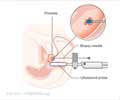Q: Which specialist doctor can do prostate cancer screening?
A: Urologist can offer such screening.
Q: Who require a PSA screening test?
A: The use of the PSA test along with a digital rectal exam has been approved to help detect prostate cancer in men 50 years of age or older. The two tests are used as prostate cancer screening tests. PSA test is also used to follow up patients who had been treated for prostate cancer.
Men with ‘risk factors’ for developing prostate cancer require screening:
- Men of the age 50 years or older require screening.
- Positive family history, i.e. if someone else in your family has/had prostate cancer.
- Race: African American men have the highest rate of prostate cancer. Rates are low in Asian and Native American men
- Diet: A diet higher in fat, especially animal fat, may increase the risk of prostate cancer
Q: How are PSA test results reported?
A: Results are usually reported as nanograms of PSA per millilitre (ng/mL) of blood. There is no specific normal or abnormal PSA level but less than 4 is considered normal. Values are correlated with a number of factors. The higher a man’s PSA level, the more likely it is that prostate cancer is present.
Q: What do elevated levels mean?
A: Elevated levels may mean the presence of prostate cancer, benign prostate enlargement, inflammation. Infection, age, race are also factors leading to raised levels. Repeated tests (PSA levels and Digital Rectal Examination) may be recommended by your doctor if you do not have any symptoms suggestive of cancer. Suspicion of cancer may mandate a battery of investigations.
A single raised PSA level is never the basis of any treatment it should always be repeated if it is elevated to reconfirm the level before asking for a prostate biopsy.
Q: Does the PSA test have limitations?
A: It is not yet known for certain whether the PSA test actually saves lives. Sometimes it may lead to over diagnosis further leading to unnecessary treatment.
False-positive test: The PSA level is elevated but no cancer is actually present. This means that a person may be wrongly diagnosed to have cancer when he doesn’t have it.
False-negative test: Sometimes PSA levels remain normal in spite of the presence of cancer. This might lead to failure in diagnosis the tumour.
Q: What is Digital Rectal Examination (DRE) to detect prostate abnormalities?
A: DRE is a relatively simple procedure where the doctor studies the prostate by feeling it (palpating) with a lubricated, gloved finger inserted into the man’s rectum.
The prostate gland is divided into different zones-the transition zone, central zone and peripheral zone. The peripheral zone can be felt through the rectum if enlarged. Most prostate cancer occurs in the peripheral zone. DRE is always recommended with PSA tests in men 50 years of age or older. The procedure lasts for less than minute. Though uncomfortable, the procedure usually doesn’t cause pain. A painful examination may point to benign conditions like infection (prostatitis).
Q: How often do I need a DRE?
A: Annual check-ups are usually recommended. Please see question number 2 for further details.
Q: Does a DRE always detect prostate abnormalities?
A: Need not. Not all parts of the prostate gland are palpable during DRE. Hence the DRE is performed best in conjunction with PSA testing.
Q: What other methods are available to detect prostate cancer?
A: Researchers are investigating several other ways to detect prostate cancer. These include: MicroRNA patterns, Non-mutation gene alterations, Gene fusions, PCA3, Differential detection of metabolites, Proteo-imaging, Protein patterns in the blood.
Explanations of these headings are beyond the scope of this article.







![Prostate Specific Antigen [PSA] Prostate Specific Antigen [PSA]](https://www.medindia.net/images/patientinfo/120x100/prostate-specific-antigen.jpg)










